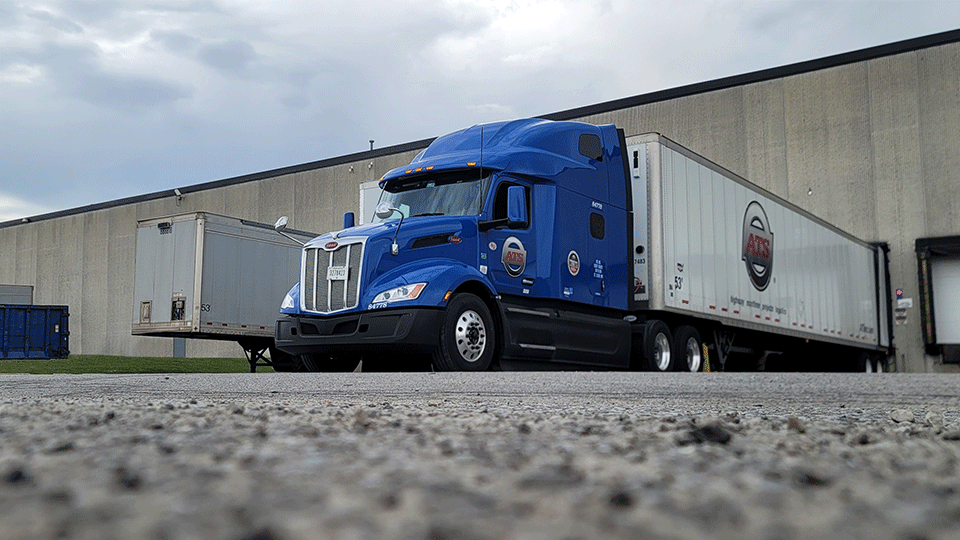- Food-grade trailer definition
- FDA food-grade standards for trucks and trailers
- What shippers need to know about procuring food-grade trailers
For any company that ships food, product safety and integrity is of the utmost consideration. Whether your products will be consumed by humans or animals, safety must be prioritized at every stage in your supply chain — and that includes transportation from your production facilities and warehouses to store shelves.
Food-grade trailers make it possible to ensure the safety and quality of food during transit. Failing to secure a food-grade transportation solution creates risk for the end consumer, you company, and your business’s reputation.
Anderson Trucking Service (ATS) is experienced in providing transportation services for many kinds of food products. After decades in this industry, we’ve earned our expertise in the oversight and planning needed to safely haul food shipments.
Meeting food-grade trailer standards for all of your food product shipments is mandatory. In this article, we’ll explain what a food-grade trailer is, the standards to which they are held, and what you as a shipper need to know about securing the right trailer for the job.

What is a Food-Grade Trailer?
A food-grade trailer is a specialty trailer type that meets the Vehicles and Transportation Equipment guidelines outlined in Food and Drug Administration’s (FDA’s) Food Safety Modernization Act (FSMA) for safe transportation of food products.
This section of the FSMA states that every vehicle and piece of equipment used to carry food products must be able to do so without contaminating them or compromising their safety for consumption.
It should be noted that the FSMA is primarily concerned with maintaining a safe food supply chain. Their standards and regulations aren’t designed to uphold the quality of human and animal food products, only the safety.
Imagine a shipment of chocolate bars: If the bars melt in transit, its quality might be compromised, but melted chocolate isn’t inherently unsafe to consume.
FDA Food-Grade Standards for Trucks and Trailers
According to the FDA’s Compliance Guide for the Sanitary Transportation of Human and Animal Food, to meet food-grade standards set by the FDA, the vehicles and equipment used in food transportation operations must:
- Be designed and of such material and workmanship as to be suitable and adequately cleanable for their intended use to prevent the food they transport from becoming unsafe during transportation; (21 CFR 1.906(a))
- Be maintained in such a sanitary condition for their intended use as to prevent the food they transport from becoming unsafe during transportation; and (21 CFR 1.906(b))
- Be stored in a manner that prevents their harboring pests or becoming contaminated in any other manner that could result in food for which they will be used becoming unsafe during transportation. (21 CFR 1.906(d))
Additionally, food requiring temperature control for safety must be designed, maintained and equipped as necessary to provide adequate temperature control to prevent the food from becoming unsafe during transportation. (21 CFR 1.908(c))
Speaking of temperature control: there are a variety of non-food products that require refrigerated (“reefer”) trailers for their transportation. To prevent cross-contamination, once a reefer has been used to ship hazardous materials of any kind, it cannot haul consumable commodities and can no longer be deemed “food grade.”
Quality transportation companies have systems and procedures in place to keep trailers in food-grade condition, including those for cleaning, inspection, maintenance and storage.

Shipping Food-Grade: Your Responsibilities
Transporting your food products safely with the proper equipment isn’t a mere suggestion — it’s your responsibility as a shipper.
But short of purchasing your own fleet of food-grade trailers and trucks, hiring a team of experienced drivers, and managing the upkeep and maintenance of these trailers yourself, how much control do shippers really have?
A lot, as it happens. Perhaps most impactful thing you as a shipper can do to ensure the safety of your consumable commodities in transit is to choose a reputable, experienced food-grade transportation provider.
Look for providers that have significant longevity in the industry, with a history of successfully moving food products at scale and the resources needed to properly service, maintain and store their vehicles and equipment.
You may also choose to have more specific requirements for your food-grade trailers beyond meeting the FSMA’s expectations.
As the party most familiar with your products, it’s up to you to determine what, if any, additional specifications you should have for the trailers that will transport your goods.
These additional requirements could include:
- Whether your commodity requires temperature control and at what temperature or temperature range
- Whether your trailer needs to be pre-cooled
- Whether pre-cleaning procedures are necessary and if a certificate is required showing proof of being professionally cleaned.
- What you don’t want to be hauled prior to your cargo (garbage, hazardous waste, etc.)
- Whether special transportation certifications are required from your driver
Be as detailed as possible when sharing these specifications with your transportation provider. The less ambiguity there is surrounding the proper transportation of your products, the more likely it is you’ll receive quality service and the appropriate food-grade solution.
Understand the Food Safety Modernization Act (FSMA)
When it comes to moving food commodities intended for consumption, you can’t cut any corners — especially if you ship perishable items that could spoil.
Food-grade trailers are a must, not only from a product quality perspective, but as a responsible shipper that puts the health and safety of the end consumer first.
A carrier experienced in providing food-grade transportation solutions will be able to provide trailers that meet FSMA regulations and service that will limit the risk of cross-contamination, spoilage, or otherwise compromised products.
Still, no matter how long your provider has been successfully moving consumables, it’s up to you to clearly and thoroughly communicate your requirements for the safe transportation of your goods.
Doing so requires a complete understanding of food safety, risk factors, and the specific nuances of your products. As such, we recommend that you continue to educate yourself and your team on food safety best practices, especially those at the intersection of food safety and transportation.
As a next step, consider checking out our article on What the Food Safety Modernization Act (FSMA) Means for Your Transportation Supply Chain.
It breaks down how the FSMA may affect your consumable freight, what the government (and your carrier) expects of you as a shipper, and what you can do to ensure compliance and safety across your supply chain.



